Rosa Carides-Hof
Community School Coordinator, Donegan Elementary

The Community Schools model supports everything from behavioral health to food access to family engagement. Can you share a moment when you saw the power of this "whole child, whole family" approach in action?
Sure. A family of five—with children aged 5, 8, and 9—was struggling financially. The children were missing school frequently and showing behavioral concerns in class, which impacted their academic progress. After a teacher referral, our Community School team mobilized support.
The parents were invited to meet with staff, including our family development specialist and guidance counselor, to address attendance and academic concerns. The community school coordinator connected them with basic resources like food and clothing. The children began in-school counseling through Lehigh University’s Community Voices Clinic, and the father was referred to employment services.
As trust grew, the parents started participating in school events like Bingo Night and Literacy Night. The children joined after-school programs and, over time, the family became more stable and engaged. Today, all three students attend school regularly and have earned attendance awards—an encouraging sign of progress through the whole child, whole family approach.
Community Schools are ultimately about changing systems. From your perspective, what systems are shifting, and how is that showing up for kids and families in South Bethlehem?
Systems are shifting in how families engage with schools. At Donegan Elementary, families increasingly see the school as a trusted hub—not just for education, but for support. They know they can turn to the staff for help with real-life challenges, and they trust the school to connect them with meaningful resources. It’s become a safe, welcoming space where strong school-family partnerships are taking root.
What’s something you’ve learned from the families or students you work with that’s changed how you approach this role?
Families want to be involved in their children's education. Donegan families are very diverse and resilient, they bring a ton of knowledge and value to our school. We share similarities and embrace differences.
This model depends heavily on partnerships. Can you share how you think Lehigh has had a real impact on Donegan?
Lehigh has had a huge impact at Donegan. As the lead partner, they hire the community school coordinator—someone central to connecting families with resources so they can focus more on their child’s learning and less on basic needs. Beyond that, Lehigh brings people and programs—from tutoring to events like Good Friday and Livin’ La Vida Lehigh—that really enrich the school community. They’re also part of a core group of partners helping us think strategically and solve problems. Honestly, we couldn’t do this work without them.
Being embedded in the school means you see a lot behind the scenes. How has that deep, day-to-day presence helped you build trust and create change?
As a community school coordinator, no community school and no day are the same. Working closely with the school administration, teachers, and students gives me a better understanding of what is needed, what the barriers are, and how we can approach the change that needs to happen to more effectively support students and families.




